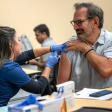
By Kate Rauch
With the remarkable success of anti-retroviral drugs, people with HIV are living longer. However, recent attention is turning to the link between HIV and chronic conditions, including cardiovascular illness.
As it turns out, people with HIV are at greater risk for heart disease than others. But the reasons for this vulnerability aren't well understood.
A recent study by UCSF cardiologist Priscilla Hsue, MD, who in 2004 started the world's first cardiology clinic for HIV patients at San Francisco General Hospital, sheds light on one conundrum facing doctors in the field—the tricky task of diagnosing atherosclerosis, or thickening of the arteries, a precursor of heart attacks.
Often referred to as a silent killer, atherosclerosis progresses without obvious symptoms. Hsue, an associate professor at UCSF’s School of Medicine, looked at two methods used to diagnose the condition—carotid ultrasound, which measures the inside thickness of the carotid artery, and a CT scan, which tests for calcium in the coronary artery. Calcium deposits in the coronary artery or thickening in the carotid artery can indicate advancing atherosclerosis.
Hsue confirmed that HIV indeed is a risk for atherosclerosis. She also discovered that looking at the carotid artery rather than calcium was more effective at gauging the condition in people with the virus.
For reasons that remain unclear, a significant number of HIV parents in the study showed thicker carotid arteries, without any unusual calcium, compared to the control group without the virus.
Hsue is already applying the results in new research. In a current five-year investigation of atherosclerosis in HIV patients, she is tracking 400 participants, regularly measuring their carotid artery thickness, along with HIV disease characteristics, and traditional cardiovascular risk factors such as smoking.
The goal is better prevention and treatment, Hsue said, adding that an urgent need exists to be able to better diagnose and treat individuals with HIV who are at increased risk for cardiovascular disease.
Hsue is also conducting a unique investigation of pulmonary hypertension in HIV patients, a rare and deadly form of elevated pressures on the right side of the heart..
About one in 2,000 people with HIV develop pulmonary hypertension, compared to one in one million in the general population. “It’s a quick-moving, devastating disease,” Hsue said. “We don’t know what puts people at risk. Are there things we can do with respect to HIV infection or on the cardiovascular side to prevent this or delay disease progression?”
Some study participants have advanced pulmonary hypertension, some early signs, and some are symptom-free. Over five-years, Hsue is regularly monitoring their pulmonary artery pressures, HIV disease characteristics, symptoms, and exercise tolerance.
Much of this work, including the regular blood tests, heart ultrasound, right heart catheterization, lung tissue sampling, and caring for patients after procedures, is being provided through Clinical Research Services (CRS) offered by UCSF’s Clinical and Translational Science Institute (CTSI).
“The infrastructure and resources provided by CTSI are crucial,” Hsue said. “They help streamline clinical research, allowing researchers like me to see more patients, and perform more complicated procedures for research purposes.”
CTSI is a member of the National Institutes of Health-funded Clinical and Translational Science Awards network. Under the banner of Accelerating Research to Improve Health, it provides a wide range of services for researchers, and promotes online collaboration and networking through tools such as UCSF Profiles.
CTSI also recently launched the UCSF Participant Recruitment Service, which offers a suite of services to support investigators in efforts to recruit study participants, potentially making it easier for researchers such as Hsue to engage in research.




